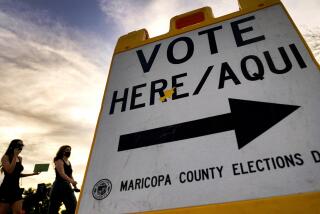Obama ‘deeply disappointed’ with court ruling on Voting Rights Act
WASHINGTON — President Obama, Atty. Gen. Eric H. Holder Jr. and civil rights lawyers sharply criticized the Supreme Court’s decision to strike down a key part of the Voting Rights Act, calling it a blow to democracy and urging Congress to take up the issue.
“I am deeply disappointed with the Supreme Court’s decision today,” Obama said in a statement. “Today’s decision invalidating one of its core provisions upsets decades of well-established practices that help make sure voting is fair, especially in places where voting discrimination has been historically prevalent.”
Obama called on Congress to act. While Republicans are greatly beholden to white Southern voters, their leadership has been determined since their loss in the last presidential election to reach out to minorities.
“I am calling on Congress to pass legislation to ensure every American has equal access to the polls,” Obama said.
PHOTOS: 2013’s memorable political moments
“The Supreme Court has effectively gutted one of the nation’s most important and effective civil rights laws,” said Jon Greenbaum, counsel for the Lawyers Committee for Civil Rights. Now, he said, cities and counties across the South “will be able to enact policies which prevent minorities from voting, and the only recourse these citizens will have will be expensive and time-consuming litigation.”
Sherrilyn Ifill, president of the NAACP Legal Defense Fund, called the decision “an act of extraordinary judicial overreach.” The court has “left millions of minority voters without the mechanism that has allowed them to stop voting discrimination before it occurs,” she said.
“We urge Congress to act with urgency and on a bipartisan basis to protect voting rights for minorities,” said Wade Henderson, president of the Leadership Conference on Civil and Human Rights.
The Voting Rights Act of 1965 made it illegal to adopt laws or rules that denied the right to vote based on race. That law still stands.
But one section gave the law teeth across the South. It targeted the blatant discrimination whereby many counties made it difficult or impossible for blacks to register to vote.
Under this part of the law, states in the so-called “covered jurisdictions” must obtain prior approval from the Justice Department or a federal court before changing their voting laws.
Currently, nine states are covered by the law, along with a few counties in other states, including California.
In Tuesday’s decision, a 5-4 majority struck down this formula as outdated. Chief Justice John G. Roberts Jr. said the special scrutiny imposed by this law must reflect “current needs,” and not rely on voting data that is 40 years old.
Holder issued a long statement decrying the court’s action.
He said that the problems of discrimination “have not been consigned to history – they continue to exist. Their effects are real, they are of today – not yesterday – and they corrode the foundations of our democracy. Our country has changed for the better since 1965 but the destination we seek has not yet been reached. “
Holder said that regardless of the court ruling, the Justice Department will “continue to carefully monitor jurisdictions around the country for voting changes that may hamper voting rights,” pledging to use “every legal tool that remains available” against jurisdictions seeking to take advantage of the ruling.
Critics of the ruling said the Constitution left Congress the power to decide on the proper remedies for racial bias in voting.
“So much for ‘originalism’ and ‘strict construction,’” said Caroline Frederickson, president of the American Constitution Society, a liberal group. She said the court’s opinion “is staggering and appalling in its disdain for the words and meaning of the Constitution, not to mention protection for the hallowed right to vote.”
The Voting Rights Act was adopted under the 15th Amendment, which says “Congress shall have the power to enforce” the ban on racial discrimination in voting. In 2006, Congress in a near unanimous vote extended the law for 25 more years.
Not all the early comments were critical, however.
Illya Shapiro, a constitutional expert at the libertarian Cato Institute, described the law as an “anachronism” and applauded the court for striking it down. “Recognizing that the nation has changed, the court aptly ended the extraordinary intrusion in state sovereignty that can no longer be justified by the facts on the ground…. Today’s ruling underlines, belatedly, that Jim Crow is dead.”
But Ifill and other civil rights advocates said they feared new efforts to make it harder to vote.
“We must now confront the poison of voter suppression in the places where it is most intense without our most effective antidote,” she said. “The ink will barely be dry on this decision before people will start hatching plans to get between Americans and the ballot box.”
Follow Politics Now on Twitter and Facebook
More to Read
Get the L.A. Times Politics newsletter
Deeply reported insights into legislation, politics and policy from Sacramento, Washington and beyond. In your inbox three times per week.
You may occasionally receive promotional content from the Los Angeles Times.











